#national hispanic media coalition
Text

Harvey's being honored by the National Hispanic Media Coalition! He'll be receiving the NHMC's Impact Award for Outstanding Performance in a Series at their gala on June 14, 2024.
#harvey guillén#harvey guillen#wwdits#guillermo de la cruz#issa lopez#issa lópez#tatyana ali#nhmc#national hispanic media coalition#impact award#may 2024
56 notes
·
View notes
Photo
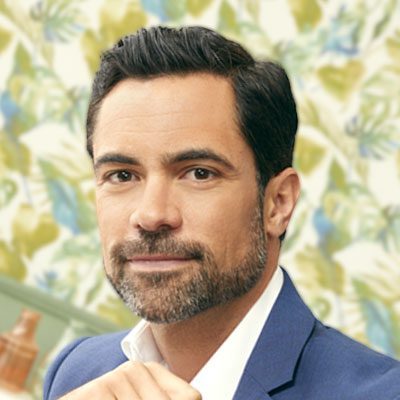
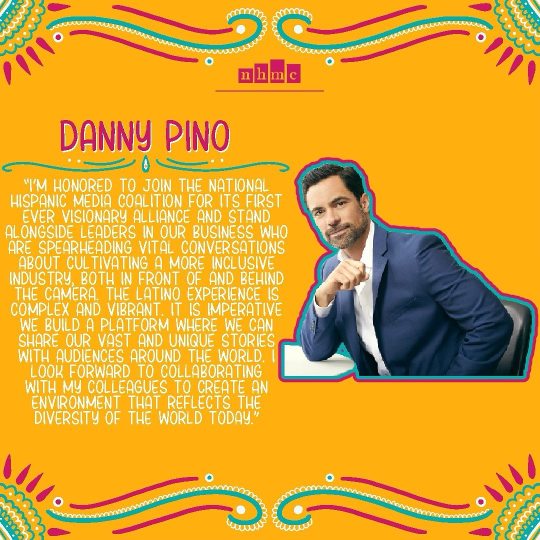
Danny Pino has joined Aubrey Plaza, Eva Longoria, Gina Torres, Gloria Calderón Kellet, Justina Machado, Lin-Manuel Miranda, Wilmer Valderrama and many more as a NHMC (National Hispanic Media Coalition) Visionary Alliance Member.
NHMC’s Visionary Alliance consists of leaders in the creative space who support NHMC’s mission throughout the year. Members will also support NHMC’s advocacy to connect, collaborate, and create opportunities for Latine talent in the entertainment industry through the Series Scriptwriters program and the Latinx Stream Showcase.Through traditional and social media, events, advocacy, and more, Alliance members are provided opportunities to emerge themselves in NHMC’s social justice work, engage with supporters to amplify its impact, and pursue NHMC’s mission of ensuring Latine representation is more than just a set of initiatives, but part of the framework of major organizations around the country.
X - X
Danny’s Bio on the website also states: Danny also recently completed the short film, UNIÓN DE REYES (Union of Kings), which he wrote, directed, produced and starred in. and there we have an update on his own short movie. it is completed but we don’t have a release date yet. stay tuned.
#danny pino#national hispanic media coalition#visionary alliance#unión de reyes#union of kings#aubrey plaza#eva longoria#gina torres#gloria kellett#justina machado#lin-manuel miranda#wilmer valderrama
8 notes
·
View notes
Text


She's so damn beautiful 😍
#emeraude toubia#2022#national hispanic#media coalition#impact awards#gala#red carpet#gorgeous#woman#beautiful#dress#hair#make-up#goals#actress
39 notes
·
View notes
Text
On 50sdale, Telenovelas, and Veronica Lodge
In the grand Genres reading of Riverdale I think it's important to place Veronica's family in the context of the telenovela, which makes for an interesting point in making her parents television stars in 50sdale. Not only were some of the first telenovelas released in the 50s, but in a modern US context the telenovela often represents family, either in content or viewing practices (since it's often something you watch with family), which ties well into the popularity of the nuclear family sitcoms in the 1950s (I Love Lucy being the most obvious). With that being said, the representation of an "alternative" family in Oh Mija! brings it closer to the family sitcoms of the 60s that were interested in palatable Otherness (Bewitched, I Dream of Jeannie, The Munsters, and perhaps most relevantly The Addams Family, where the family was originally of Castilian descent but has since become incredibly Latine).
Palatability in this case I think operates on two levels: 1950s taste and modern taste. In the case of the 1950s, we have the show directly addressing what that could mean for an actor through morality clauses and communist suspicion related to Cuban ties; which I think is especially interesting considering that one of the first telenovelas was the Cuban Senderos de amor in 1952. In a through line from 1950s to modern media there stands the question of representation (who gets to represent and tell these stories), which in some ways comes through Veronica's role as daughter being recast and given to Tillie Thompson. The US sitcomification of the telenovela in this case then acts as the driving force for familial separation, where garnering acceptance at large through some level of cultural assimilation and behavior monitoring comes at the sacrifice of family and ones own latinidad. Interestingly enough, Veronica does eventually return to Hollywood as a producer, originally by means of Josie who highlights the importance of own voices productions on every level.
It's also of note that Peter Roth also gives Veronica a chance in the show - same as he did for Riverdale in real life. Others have spoken to Jughead being RAS's love for comics, Kevin his love for musical theater, and if we approach this through a similar lens, in some ways I think Veronica speaks to an appreciation for his position in film and television (did you know: the National Hispanic Media Coalition awarded RAS for his work as an "Outstanding Executive Producer"). While I think the show's approach to Veronica's latinidad is often a bit... odd, the show's telenovela sensibilities have always run strong. In a season where many of the character arcs revolved around taking control of their own stories across mediums, I think to some degree Veronica taking control on a production level speaks to a history of Latines in Hollywood.
77 notes
·
View notes
Text

Eva Longoria – National Hispanic Media Coalition’s 2023 Impact Awards Gala in Los Angeles 10/27/2023
50 notes
·
View notes
Text
Watching the watchdogs: How US media weaponised campus protests coverage
A great, novel experiment in political physics is under way in the United States, as the unstoppable moral force of youth-led protests against Israel’s genocidal war in Gaza runs into the immovable object of the American power elite’s support for it.
In this clash, two critical forces have been weaponised: the US mainstream media that heavily disseminates Israeli propaganda and shapes many local, state and national policies, and the scourge of anti-Semitism that has been unfairly used to demonise and silence Palestinians and shift attention away from the US-enabled Israeli genocide in Gaza.
Since Israel launched its assault on Gaza, President Joe Biden’s steadfast support for it has galvanised young Americans and pushed them to mobilise.
They have formed decisive coalitions with Muslim and Arab Americans, Jewish, Black, Hispanic and Native communities, labour unions and churches. They have given notice that if the US continues to support the war, they will abandon Democratic candidates in the November elections, which would likely be fatal for the party.
The American power elite largely ignored the initial criticisms of the young and the marginalised, until student encampments started springing up at universities across the country three weeks ago. The students demanded an immediate ceasefire in Gaza, a halt to US government financial and military aid to Israel, and the divestment of university investments from military industries that enable the Israeli genocide.
The mainstream media’s coverage of the campus encampments and the violence against them has exposed it as a central actor in the power elite that sustains Israel’s war and simultaneously tries to silence Palestinians and criminalise anyone who supports them.
As I closely followed US media outlets in recent weeks, I was shocked to see reporters, commentators and hosts use the exact same words and phrases that Biden and US and Israeli officials have used to smear the protesters. The mainstream media gives the impression of circling the wagons with Israeli and American officialdom to prevent at all costs an open, honest, comprehensive and contextualised public discussion on Israel’s behaviour while trying instead to focus public attention on spurious accusations.
The mainstream media has widely condemned students and accused them of using “hate speech and hate symbols” (in the words of the US president), endorsing terrorism, advocating for Israel’s destruction, resorting to anti-Semitic slurs and threatening and frightening Jewish students. Everywhere they look in the student protest encampments, the media oracles have seen “terrorists” in training, “anti-Semites” at work, “Jew-haters” being groomed, universities collapsing, and “Nazi mobs” in the making.
Prominent TV hosts have unleashed passionate, vicious diatribes against the students who have camped out to demand an end to America’s role in Israel’s genocide against Gaza, and peace and justice for all in Palestine.
MSNBC’s Morning Joe show – reportedly a Biden favourite – is one glaring example of systematically biased TV programming that sometimes veers into incitement against the student protests and the university administrators. One of its hosts, Joe Scarborough, has claimed that students want “to wipe out all Jews”, “they are Hamas on college campuses”, and they are “not helping those of us who want to fight fascism in America”. His co-host Mika Brzezinski has said that the campus protests “look like January 6”, referring to the riot by Donald Trump supporters on Capitol Hill in January 2021.
Such unsubstantiated allegations against the protesters are common to varying degrees across all the major networks, including ABC, CNN and NBC.
Most of the “expert” analysts I have heard on mainstream TV in the last few weeks commenting on the protests have been former US government or security officials, or people close to the Israeli viewpoint, including former Israeli officials. They have also offered variations on the themes of terrorism, radicalisation and anti-Semitism.
Except for some interviews I have seen on MSNBC, networks have avoided inviting Palestinians and knowledgeable Americans who could explain the actual meaning of expressions that the media and officialdom find offensive or threatening, and could address the actual nature and extent of the fears of those Jews who sincerely worry about how the protests impact them.
Unsurprisingly, most media outlets have covered US officials’ statements against peaceful protesters on campuses without much scrutiny as well.
This was apparent, for example, when Republican Speaker of the House Mike Johnson and heads of several key congressional committees gave a press conference on April 30 where they threatened universities for allegedly allowing anti-Semitism to thrive on campus.
“We will not allow anti-Semitism to thrive on campus, and we will hold these universities accountable for their failure to protect Jewish students on campus,” Johnson said.
By reporting the many accusations against the protesters without seriously questioning or verifying them, the mainstream media itself appears to adopt the conflation of anti-Semitism with valid criticism of Israeli policies, which many scholars have warned is a dangerous practice. Israeli policies that warrant criticism include patently illegal ones that contravene international law, like expanding settlements, laying siege to Palestinian territories, and carrying out the genocidal attack on Gaza.
While mainstream media has struggled with its biases in covering the campus protests, there have been reports and commentaries by serious and knowledgeable people who actually have spent time among the defiant students, understood their motivations and their cause, and have not been beholden to domestic or foreign lobbies. Everyone I encountered – in person at universities or in the more honest, independent and progressive media outlets that do not see their job as supporting the power elites’ war-making frenzies – has reported calm, harmonious, often joyous gatherings of many faiths, aiming for a common goal of equal justice for all.
The alignment of mainstream media with the American political elites’ stance and all the exaggeration, misinterpretation, hysteria, lies and hallucination is unprecedented. It begs the question, why American officials and media leaders who traditionally parroted the Israeli line and simply ignored Palestinian voices are all up in arms now? Why would a gentle old man like Biden knowingly transform the Arabic word “intifada” (uprising) into what he calls “tragic and dangerous hate speech”?
I suspect this fanatical rhetoric reflects the power elite’s fear of being challenged in the domestic political arena for the first time ever by an issue related to Palestinian rights that also exposes and opposes Israel’s military extremism and genocide. They fear the growing coalition of Americans who are not afraid to challenge the falsehoods and distortions of staunch Israel supporters or ignore biased media offerings. They should worry, as a CNN poll last week suggested that 81 percent of Americans aged 18-35 disapprove of the American-backed Israeli war policy in Gaza.
Many young protesters have spoken of the US-enabled genocide in Gaza as “the moral issue of our age”. They feel they cannot stay silent in the face of Israeli-made starvation and American-made bombs ravaging Gaza.
But when this principled stance is distorted by the US mainstream media into an “anti-Semitic” and “pro-terrorist” frenzy, then it becomes clear that the commitment to truth-telling in large swaths of the media is far weaker than their desire to be close to the imperial seats of war-making power in the US and the Middle East.
2 notes
·
View notes
Text










Lana Parrilla at the National Hispanic Media Coalition Impact Awards Gala, 2022
14 notes
·
View notes
Photo
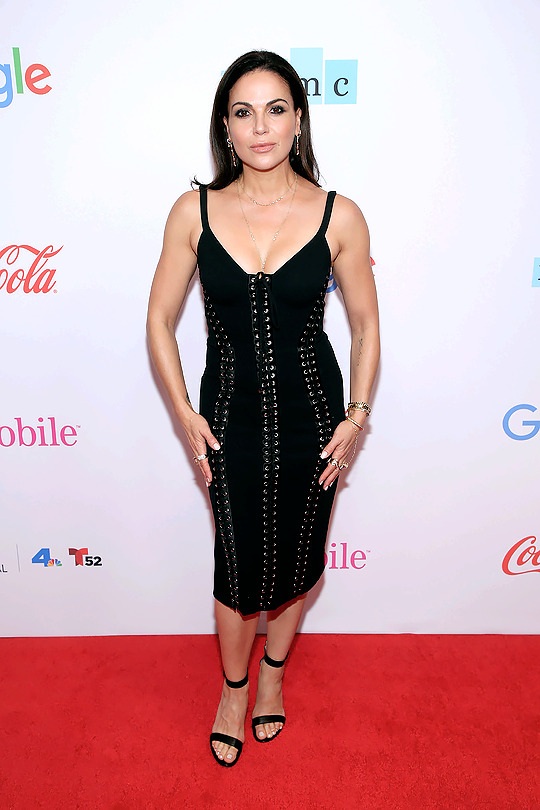
National Hispanic Media Coalition 2022 Impact Awards Gala in Beverly Hills - September 9, 2022
4 notes
·
View notes
Text
0 notes
Text
Aim for excellence — Brown exellence,” actor-producer Wilmer Valderrama told this year’s graduates of the National Hispanic Media Coalition‘s Series Scriptwriters Program as the eight-week intensive came to an end earlier this week.
Valderamma, the “NCIS” and “That ’70s Show” star, is a multihyphenate, activist and entrepreneur and a member of NHMC’s Visionary Alliance of entertainment industry figures who support the organization in Hollywood. He addressed the 10 participants in the TV and film writing program that includes virtual instruction, networking and mentoring opportunities. NHMC has run the Series Scriptwriters writer development program for more than 20 years.
“The writers in the program are an answer to the need to increase Latino representation in our writers rooms and make sure we are telling our own stories,” Valderrama told the group on Dec. 19 via video conference. “As we become the majority as the audience, consumers and storytellers, it is more vital than ever that we are committed to uplifting and supporting new voices.”
Participants in the NHMC program have gone to work on series and pilots for streamers including Netflix, Amazon Prime Video, Disney+, Hulu and Max and for such studios as NBCUniversal and Paramount. Valderrama acknowledged that the graduates face an uphill climb as they build their careers. He emphasized that every step they take forward as creators is meaningful for past, present and future generations.
“There will come a time when you’ll feel like the only Brown writer in the room. Instead of it being daunting, think of it as an opportunity to be bold,” Valderrama urged. “The Latino revolution will come in the form of content. Immortalize what you want, the community deserves it. Make sure the leading roles in your stories look like you — this is a love letter to your parents and grandparents. Aim for excellence. Brown excellence.”
This year’s NHMC Series Scriptwriters Program graduates are:
Diego Lanao (New York): “The Right One Alive,” pilot, 2022 Latinx List
Hayley Muñoz (McAllen, Texas): Staff writer, CW’s “Nancy Drew”
Jeanette Dilone (New York): Short films, “Hoar” (2022); “Rizo” (2020); “Return” (2017)
K. Broch (West Michigan): Blogger, makeup artist, podcast host, “She Said…Let’s!”
Natalie Wood (Texas): Coordinator, Red Hour Films; support staff, “Severance,” “Chicago Fire”
Paloma Lamb (Pasadena, Calif.): Writers assistant, “Our Flag Means Death,” “Marvel’s Echo”
Ruben Mendive (Chicago): Participant, Hillman Grad Mentorship Lap, Outfest Screenwriting Lab; podcast host, “La Lista: A Latinx Writers Podcast.”
Sofia Brown de Lopez (Los Angeles): Loyola Marymount University, B.A. in playwriting and screenwriting, 2019; short film “Gone” (2021)
Victoria de la Concha (New York): Loyola Marymount University, M.F.A. in writing and producing, 2019
Zayda Exeliz (Los Angeles): Creative content manager, Universal Pictures
Pictured from top left: Mentor Geoff Harris, Wilmer Valderrama, mentor Omaira Galarza and participants Natalie Wood, Sofia Brown de Lopez, Zayda Exeliz, Jeanette Dilone, Victoria de la Concha, K. Broch, Diego Lanao, Ruben Mendive, Hayley Muñoz and Paloma Lamb
0 notes
Text
The wind is Blowing in California for the 2020 General Election.
The 2020 General Election in California is on the horizon, and political winds are blowing across the state. With its diverse population and substantial electoral votes, California holds significant sway in determining the outcome of national elections. As the campaigns gear up and the candidates make their case to the voters, the Golden State stands ready to play a pivotal role in shaping the future of American politics.
Changing Demographics and Voter Engagement
One of the most notable factors impacting the California elections is the state's changing demographics. With a large population of Hispanic, Asian, and other minority communities, California has become a melting pot of cultures and perspectives. As these communities continue to grow, their influence in the political landscape becomes increasingly important. Candidates must now navigate the complexities of appealing to a diverse range of voters, crafting their messages accordingly.
Moreover, voter engagement is expected to be high in California. The state has been at the forefront of initiatives to increase voter turnout, implementing policies such as automatic voter registration and expanding early voting options. These efforts have paid off, as California saw a record-breaking turnout in the 2018 midterm elections. Similar enthusiasm will likely be witnessed in the upcoming General Election, further underscoring the significance of California's role in shaping national politics.
Key Issues Shaping the Election
Several key issues are expected to dominate the political discourse in California during the 2020 General Election. One of the most pressing concerns is climate change and environmental policy. California has been a leader in implementing progressive ecological regulations, and voters are likely to pay close attention to candidates' stances on clean energy, carbon emissions, and conservation issues.
Another critical issue is healthcare. With the ongoing debate over the Affordable Care Act and the need for accessible and affordable healthcare, Californians will seek candidates to address their concerns. The state has a significant uninsured population, and the outcome of the General Election could have far-reaching implications for healthcare policy within California and across the nation.
Additionally, housing affordability is a pressing matter in California. The state has been grappling with a housing crisis characterized by skyrocketing prices and an acute shortage of affordable housing. Californians will be eager to hear proposals from candidates that address this issue and offer viable solutions to ensure housing remains attainable for all residents.
Candidate Strategies and Political Dynamics
California is traditionally a stronghold for the Democratic Party, and it is unlikely to change significantly in the 2020 General Election. However, this does not mean that candidates can afford to take the state for granted. In a crowded field of Democratic hopefuls, candidates must tailor their messages and policy proposals to resonate with California's progressive electorate. Building coalitions with key interest groups and appealing to a wide range of demographics will be crucial for success.
On the Republican side, while the state has become increasingly Democratic-leaning, there are still pockets of conservative support. Republican candidates must focus on energizing their base while reaching out to moderate voters who may be disillusioned with the Democratic Party.
Campaigning in the Digital Age
The 2020 General Election in California will witness the full force of campaigning in the digital age. Social media platforms, online advertising, and digital organizing will be crucial in reaching and mobilizing voters. Candidates who effectively utilize these tools to convey their messages and connect with Californians are likely to gain a competitive advantage.
Furthermore, the COVID-19 pandemic has reshaped traditional campaign strategies, with in-person rallies and events giving way to virtual town halls and online forums. Candidates who can adapt to this new reality and engage with voters digitally will have a better chance of making a lasting impression.
As the wind blows across California, it brings the promise of change and possibility for the 2020 General Election. With its diverse population, evolving demographics, and significant electoral influence, the state stands poised to shape the future of American politics. The issues at stake, the strategies employed by candidates, and the evolving nature of campaigning in the digital age all contribute to the excitement and anticipation surrounding the upcoming election. As the campaigns unfold, the eyes of the nation will be on California, watching to see which way the wind will blow.
1 note
·
View note
Photo
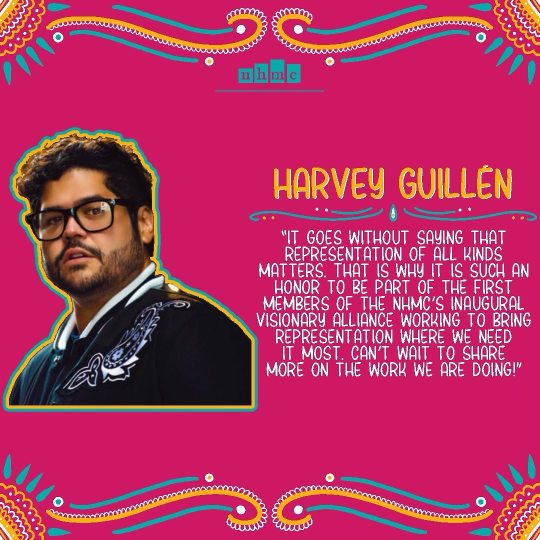
Harvey has joined the inaugural Visionary Alliance for the National Hispanic Media Coalition! As The Hollywood Reporter describes:
Alliance members will lend their professional expertise to longstanding NHMC entertainment initiatives such as its Series Scriptwriters Program and Latinx Stream Showcase and also get involved in the nonprofit’s social justice and policy advocacy work.
“NHMC is about representation from the White House to Hollywood,” the coalition’s president and CEO Brenda Victoria Castillo tells THR. “The policies and decisions that are made in D.C. affect Hollywood. The way Hollywood decides they’re going to portray Latinos is the way we’re perceived and the way the public treats us, and it’s a vicious cycle.”
The inaugural Alliance members also include Ismael Cruz Córdova (The Lord of the Rings: The Rings of Power), Wilson Cruz, Rosario Dawson, Diane Guerrero (Encanto, Doom Patrol), Harvey Guillén (What We Do in the Shadows), Eva Longoria, Gabriel Luna (The Last of Us), Justina Machado, Encanto producer Yvett Merino, Lin-Manuel Miranda, Danny Pino (Mayans M.C., Law & Order: Special Victims Unit), Aubrey Plaza, Gina Torres, Wilmer Valderrama and Lisa Vidal (Being Mary Jane).
#harvey guillén#harvey guillen#nhmc#national hispanic media coalition#nhmc visionary alliance#advocacy#gloria calderón kellett#brenda victoria castillo#ismael cruz córdova#wilson cruz#rosario dawson#diane guerrero#eva longoria#gabriel luna#justina machado#yvett merino#lin-manuel miranda#danny pino#aubrey plaza#gina torres#wilmer valderrama#lisa vidal#march 2023
34 notes
·
View notes
Text
¿Y Ahora? Where Are the Cast of "East Los High" Today?
“East Los High” started as a web series. Created by Carlos Portugal and Kathleen Bedoya, the critically acclaimed show won the 2016 National Hispanic Media Coalition Impact Award for outstanding online series and eventually got picked up by Hulu. “East Los High” broke barriers with its diverse cast and storytelling. The series also touched on deep topics, everything from teen pregnancy to…
View On WordPress
0 notes
Text
Why Did Nicholas Gonzalez Leave The Good Doctor? Explained
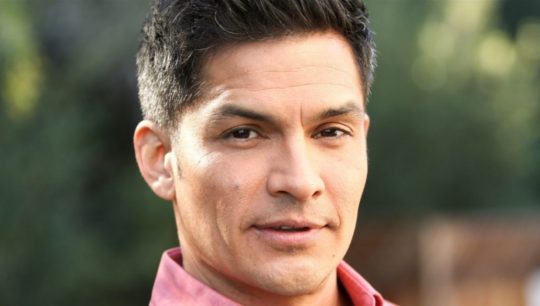
Want to know the reason, why did Nicholas Gonzalez leave The Good Doctor? This is something that most of the fans are going crazy to learn. Well, he played the character of Dr. Neil Melendez and left the show at the end of Season 3. The impact was brought realistically in the series. Despite that, fans were disappointed with his absence.
Starting from the basics, Nicholas Edward Gonzalez gained fame for his role as Alex Santiago in Resurrection Blvd. Some of his other notable works are listed as Falling Awake, The Purge: Anarchy, Undressed, American Family, Law & Order: Special Victims Unit, Melrose Place, Mental, Bordertown, Modern Family, etc. Are not you watching Nicholas in La Brea playing the role of Captain Levi Delgado? He is doing great.
Born on 3 January 1976, Nicholas is now 46 years old. The actor hails from San Antonio, Texas, United States. For his incredible performance, he received an Impact Award, from the National Hispanic Media Coalition.
Well, in The Good Doctor Season 4, Nicholas as Neil was absent from the staff at the St. Bonaventure Hospital. If you are looking for the reason behind Nicholas Gonzalez's leaving The Good Doctor, here are your answers.
Also Read: Why Did Kal Penn Leave House? The Real Reason Behind it
Reason Behind Nicholas Gonzalez Leaving The Good Doctor Revealed
When asked about Nicholas Gonzalez as Dr. Neil Melendez's departure from The Good Doctor, it turned out to be very much realistic, as explained before. The executive producer and the showrunner, David Shore opened up about it. As we know, his character died at the end of Season 3. On this note, he said that it served as a reminder to the audience that the other fellow characters were still there. Most importantly, it showcased that tragedy is a very significant and real part of life.
He added saying that one would want to confront mortality while doing a series like The Good Doctor. Also, he shared that bad things do happen, no matter how hard one tries not to deal with them. He wanted to see how the audience would react to both bad and good news. Taking note of this, Nicholas left the show having no feud or bad blood with the crew.
Moreover, David shared that Nicholas acted amazingly but the former was following where the story would take him. Many fans wondered why the actor was specifically chosen for his character to get ended so early with a tragic death. Well, there was nothing personal, as shared by the showrunner himself. He said, "I'd rather not go into it, particularly."
Well, it was meant to happen like that. So, it happened. David and Nicholas shared a great bond and were pretty close. Despite his exit, following the end of his character, David never failed to gush about Nicholas, whenever asked.
Why did David plan to end Nicholas' character? As mentioned already, it was not planned but was meant to take place. On this note, the former said that his death was considered to be a big loss to The Good Doctor's audience because he had relationships with most of the leading characters. David said that he wanted to lose such a character that people would feel something about, mainly the pain. Also, he felt like Neil Melendez was such a character that people majorly be in touch with. In some way or the other, it made them explore more relationships in the show. What's your say on this? Are you still disappointed? Being a fan, you would! But, concerning the plot, the reason was pretty much understandable and valid.
Talking more about it, Nicholas was very much aware of the end of his role in The Good Doctor right after Season 3. Well, by the time he joined the series, the actor faced quite a new thing in his personal life. So, he was dealing with that. While leaving the show, things got more difficult for him. However, he was proud enough of how the character ended.
Wishing Nicholas Gonzalez nothing but the best for his future days. He is continuing his wonderful work in the industry. You may give Nicholas a following on his Instagram account, for more updates. Sending loads of love!
Also Read: Why Did Glenn Rhee Leave The Walking Dead? Reason Behind It
Read the full article
1 note
·
View note
Text
Paramount Pictures is Protested by Latino Group for its Lack of Representation - CULTURE
New Post has been published on https://citizentruth.org/paramount-pictures-protested-by-latino-group/
Paramount Pictures is Protested by Latino Group for its Lack of Representation

Two Latino civil rights organizations staged a protest on Saturday outside Paramount Pictures in Los Angeles, to draw attention to the lack of Latino representation in its films.
Leaders for the National Hispanic Media Coalition (NHMC) and the National Latino Media Council (NLMC) focused their efforts on Paramount, citing statistics from University of Southern California (USC) and its Annenberg Inclusion Initiative — with their own research showing Paramount had the fewest number of Latinos in films.
Both organizations met this past Tuesday in Pasadena to discuss a poll of Latinos viewers’ sensibilities and unveiled a list of planned actions against Paramount.
This lack of representation pervades all through Hollywood as well. Fewer than seven percent of speaking characters in the top 100 films over an 11-year period spanning from 2007 to 2017 were Latino, according to the USC report published last month.
Based on their film studio research from 2012 to 2017 — and UCLA’s latest Hollywood Diversity Report, released in February — the NHMC found that Paramount had the worst numbers when it came to hiring Latino actors, writers, and directors.
According to NHMC’s just-released “Lack of Latinx in Film Industry,” which narrowed its focus on the top 100 grossing films per year between 2016 and 2017, Paramount released no films featuring either a Hispanic writer or a Hispanic actor in a lead role. During that period, Paramount released 20 survey-eligible films. In 2017, Paramount distributed only one movie from a Hispanic director, Spaniard F. Javier Gutiérrez’s Rings.
Alex Nogales, NHMC president, said that his organization also decided to target Paramount after an unsuccessful meeting with studio executives earlier this summer to reach a memorandum of understanding. Nogales said those agreements help set goals in writing in how the studio would boost Latino representation in its films.
The talks stalled after a tense meeting between NHMC leaders and Paramount executives who felt the civil rights group was being overly aggressive in their demands. Nogales defended his tactics, saying that change in the industry was long overdue.
A studio spokesperson late last month said Paramount executives “met with NHMC in a good faith effort to see how we could partner as we further drive Paramount’s culture of diversity, inclusion and belonging. Under our new leadership team, we continue to make progress — including ensuring representation in front of and behind the camera in upcoming films such as Dora the Explorer, Instant Family, Bumblebee and Limited Partners — and welcome the opportunity to build and strengthen relationships with the Latinx creative community further.”
Indeed, diversity could be seen as a boon for business: in the aforementioned poll, completed by 423 individuals who self-identify as Latino or Hispanic, 66 percent of said viewers were more inclined to watch films with Latino themes, while 61 percent would prefer films from Latino actors, writers, and directors. Another 51 percent said they would either eliminate or watch viewer films from the least-inclusive studio.
As of 2016, the Pew Research Center stipulated that there were 58 million Latinos in America, accounting for 18 percent of the population. The 2018 Hollywood Diversity Report found that less than three percent of speaking parts in films go to Latino actors.
Nogales urged Latinos to sign a petition, picket Paramount Pictures, and cease buying tickets for its films. The boycott demonstration was held at 11 a.m. Saturday, August 25.
Groundbreaking New TV Series ‘Vida’ Features First Latina Showrunner & More
#Diversity#Film#Hollywood#Latino#Latinx#Movies#National Hispanic Media Coalition#National Latino Media Council#Paramount Pictures#Race
0 notes
Video
Zoë Saldana by Richard Sandoval
Via Flickr: Our photo of the day, hmmm what was she thinking?
National Hispanic Media Coalition 2011 Gala
2 notes
·
View notes
